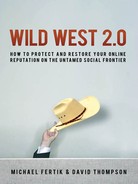are some signs that this is starting to change. Several high-visibility
online attacks have highlighted the strange results of Section 230,
and Congress is beginning to reconsider the broad grant of immunity
to websites. Other regions of the world, including Brazil and the Eu-
ropean Union, allow lawsuits against online intermediaries; the In-
ternet has not come crashing to a halt in those places, and Congress
is taking note of their examples.
Removing Content from Archives
Information on the Internet is often automatically cached and
archived in a variety of ways. The impact is that smears on one site
may be stored on other sites without any human intervention. These
copies of the original smear can live on long past the original.
Several archived copies of smears will expire on their own, with no
need for intervention in most circumstances. For example, Google
automatically stores a copy of web pages and automatically deletes the
stored copy if the underlying page is deleted or altered. Normally this
process occurs on its own, but it may take several weeks for Google to
discover that the underlying page has been altered or removed. You may
speed up the process by following this link: https://www.google.com/
webmasters/tools/removals?pli=1. If the offensive page has been re-
moved entirely, then choose the option for an “outdated or dead link”
and provide the requested details. The only other way that Google will
remove a page from its index is if it contains your social security num-
ber, bank account number, or credit card number. These requests can be
submitted at the same URL, but choose the “remove information” link
instead.
On the other hand, some copies are permanent. The “Wayback
Machine” at Archive.org makes permanent copies of historic web
pages. If you would like a page removed from the Wayback Machine,
you will need help from the owner of the site where the page used
to reside (for example, if you were smeared at [fictional]
“bloghost.com/nastysite,” you would need help from the owner of
Wild West 2.0232
233Recovering from Online Smears
“bloghost.com”). Instruct the webmaster to use the guide at
http://www.archive.org/about/exclude.php to retroactively remove
the negative content. If you are unable to get a webmaster’s help, your
job is much more difficult; the Wayback Machine claims to support
only automated requests. But, there is a human editor who may be
amenable to requests to remove pages that display personal infor-
mation, especially if that information was given in confidence. It
never hurts to try to send a polite email explaining the problem and
to try to work toward a resolution: info@archive.org.
Notes
1. The cartoon never specifies what the other half is. G.I. Joe: A Real American
Hero (1980s television program). The catchphrase is still in use in current
pop culture. Go: http://wildwest2.com/go/1007.
2. Unnamed Wikipedia contributors, “The Clinton Doctrine,” Wikipedia. Go:
http://wildwest2.com/go/1008.
3. As of this writing, removing vandalism was approved behavior for users
themselves. See the Wikipedia policy statement here: Go: http://wildwest2
.com/go/1009.
4. Ibid.
5. Sue Scheff, Google Bomb: The Untold Story of the $11.3M Verdict That Changed
the Way We Use the Internet (Deerfield, Fla: Health Communications, 2009).
..................Content has been hidden....................
You can't read the all page of ebook, please click here login for view all page.
